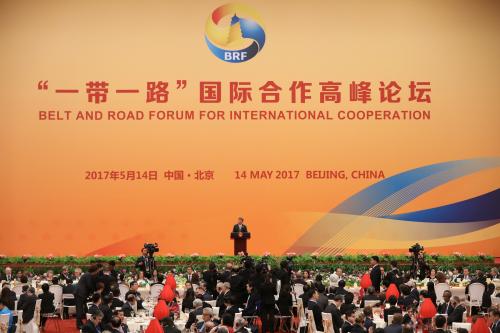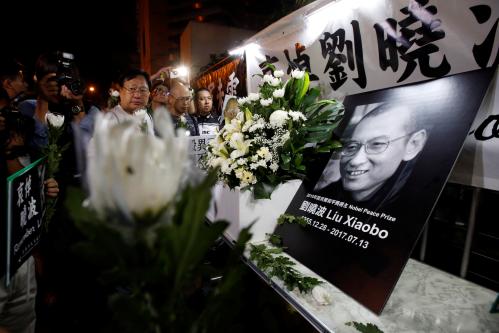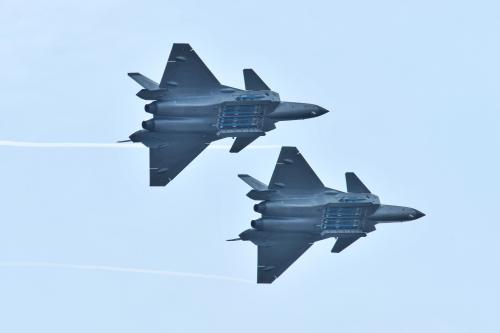Xi is China’s most powerful leader since Deng. Xi has scrapped the People’s Republic of China (PRC) constitutional rule that limited the term of PRC chairman to 10 years. Xi has fostered a new cult of personality; the PRC constitution now enshrines “Xi Jinping Thought of Socialism with Chinese Characteristics.” But Chairman Xi is not Emperor Xi. Forces that oppose Xi may be dormant but their powers remain intact, and criticisms of Xi’s administration have been multiplying since the 19th Party Congress.
Chinese people often say that foreign relations are the extension of domestic politics (waijiao shi neizheng de yanxu). How is Chinese foreign policy shaped by Xi’s political position after the 19th Party Congress and the dynamic of Chinese elite politics? Some argue that Xi, in order to consolidate power, has adopted the twin strategy of domestic repression and foreign aggression. Domestically, Xi cracks down on both popular discontent and elite dissent with increasingly authoritarian measures. Internationally, Xi expands Chinese military presence in the South China Sea and flexes Chinese muscles globally through initiatives such as the Belt and Road Initiative (BRI). Playing the game of great power competition gives Xi the ammunition to incite nationalism and rally the Chinese nation behind him despite a multitude of domestic troubles.
This line of thinking has its origin in diversionary war theories, which rest on assumptions that do not hold for Xi. Xi’s domestic troubles, instead of making him more confrontational, would pressure Xi into improving China’s foreign relations and in particular Sino-American relations. This opens up the possibility for Sino-American relations to improve in the next few years, ceteris paribus.
Who are unhappy with Xi and why?
On May 4th 2018, Fan Liqin posted a 24-page “big-character poster” (dazhibao) at a public bulletin area in Peking University that sharply criticized Xi. This is significant in two ways. First, Fan is a close friend of Deng Pufang, Deng Xiaoping’s first son who was crippled by the Red Guards during the Cultural Revolution. Fan’s big character poster, therefore, represents the attitude of at least some “red aristocrats” towards Xi. Second, Fan’s big-character poster criticized Xi using the “party’s language.” Specifically, Fan, by referring to historical CCP debates on the perils of personality cults, attacked Xi’s removal of the PRC leader term limit and Xi’s ambition to “dress himself up as the emperor and the savior of the Chinese nation.” If someone as brilliant as Mao could become arrogant and make serious mistakes when he concentrated power, why would Xi, “an average party functionary” (Fan’s words), be immune from the same corruptive effect of power?
In July 2018, another influential critique of Xi emerged. Xu Zhangrun, one of China’s top legal scholars who is based in Tsinghua University (Xi’s alma mater), published a trenchant critique of Xi. As in the case of Fan’s dazhibao, Xu questioned Xi’s scrapping of the term limit. Furthermore, Xu also disapproved Xi’s disrespect of private property (“if you are on the wrong side with a government official, risk bankruptcy and your life”) and Xi’s support for state-owned enterprises (SOEs) at the expense of competitive private business. Lastly, Xu blasted Xi for antagonizing the United States while hobnobbing with corrupt totalitarian regimes such as North Korea and Venezuela.
Many of Xu’s complaints are picked up by participants in the Chinese Economists 50 Forum, which was founded by Xi’s economic guru and current vice premier Liu He. Its members include the most influential technocrats and economists in China (e.g. former finance minister Lou Jiwei). During a special meeting commemorating the 40th anniversary of PRC’s economic reform and opening up on September 16, 2018 (which Liu He attended), many of the forum members expressed concern over the current Chinese administration’s promotion of state capital over private enterprise, and the erosion of rule of law as the state takes control of the economy.1
These episodes point to two lessons. First, elites from across the political spectrum in China oppose Xi’s concentration of power; Xi’s scrapping of his term limit is a watershed that galvanized opposition. Second, there is a pervasive sense that Xi has deviated from China’s overall path of political and economic developments after the turmoil of the Cultural Revolution.
Fan, Xu, and participants of the Chinese economists 50 Forum do not wield real political power in China, but their opinions are important for at least two reasons. First, they are opinion leaders who may influence the actual power brokers if not Xi himself. After Fan’s protest, Xi temporarily scaled back his promotion of the cult of personality surrounding himself. Second, these people’s opinions are good proxies of the opinions of the CCP power brokers. They grew up and went to university with top CCP leaders and are in the same social circles. The fact that these people aired—and expressed this publicly—is an indication that at least some people within the CCP’s top echelon are also unhappy with the current administration.
Factional politics under Xi
Some argue that the era of factional politics has ended in the PRC as Xi concentrates power. But this is not the case. Chinese factions are often centered around top national leaders, such as former party secretaries Hu Jintao and Jiang Zemin. Their influence has been weakened by Xi’s anti-corruption campaign, which eliminated many of their protégés. Nonetheless, Xi could not eliminate Hu and Jiang for at least two reasons. First, both Jiang and Hu built extensive patronage networks when they were in power. Their protégés therefore consist of entire cohorts of provincial governors, generals, and technocrats. Xi needs them to run the country before he could fill up the positions with his own people.
Second, it is difficult for Xi to attack Jiang and Hu directly. Xi has broken the convention of not prosecuting a retired PSC member by going after Zhou Yongkang, but Jiang and Hu are different. Because Jiang and Hu are both former PRC leaders, it would be difficult to attack them without also discrediting CCP’s reign under their leadership, which risks delegitimizing CCP rule. Jiang and Hu, therefore, are largely immune to prosecution.
While Xi could do little to further undermine the rival CCP factions, these factions could now “bide their time” and wait for Xi to make enough mistakes before possibly striking back. In PRC’s 70-year history, five top leaders have been forced out of power. Mao (temporarily) and Hua Guofeng were forced out for radical leftist policies. Liu Shaoqi, Hu Yaobang, and Zhao Ziyang were forced out for their rightist predilection for economic and political reforms.2 Historically, top CCP leaders are held accountable for major “policy mistakes” as defined by the power brokers at the time of their removal. As the earlier discussions suggest, there are already signs that the CCP elites believe that Xi has gone too far in his concentration of power and support for state over private enterprises. Xi is also under pressure for the recent Sino-American trade war, which reinforces the narrative that a totalitarian Xi is bound to make mistakes and led China astray.
Note that the top CCP leaders mentioned above were often removed from power due to a surprise attack at either a major party conference or an emergency PSC meeting. It is rumored that the current administration had the party elites closely monitored during both the 19th Party Congress and the Beidaihe summer retreats where current and retired CCP leaders meet informally. This is a sign that Xi is not terribly confident of his hold on power.
Why Xi does not want conflict
The theory of diversionary wars posits that leaders often have the incentive to pursue aggressive foreign policies in order to divert the domestic audience’s attention from domestic troubles. Through international conflict, leaders can either foster national solidarity or demonstrate their competence. Could Xi seek to consolidate power by adopting an assertive foreign policy in his second term?
Crucially, diversionary war theory rests on a number of assumptions, two of which do not hold for Xi today.
Assumption 1: Leaders prefer foreign adventure over addressing domestic troubles.
As discussed earlier, in the realm of domestic policies, Xi has been criticized for primarily two things: his promotion of his cult of personality and a slowing Chinese economy overly focused on inefficient SOEs. It is easy for Xi to dial back his cult of personality, and he has already done so. Reverting his policy of guo jin min tui (“as the state advances, the private sector retreats”) is not going to be easy and would entail important financial system and legal reforms (see discussions from the 2018 Chinese Economists 50 forum), but is quite doable. There is little reason why Xi would want to create international tension to distract his critics when it is much more straightforward to directly address the domestic issues. Furthermore, a diversionary skirmish involving Vietnam or the Philippines over one of the South China Sea islands would hardly be significant enough for diversion. To rally the nation behind him, Xi must pick on Taiwan, Japan, or even the United States. The problem is that a confrontation with either Taiwan or Japan is highly risky. The Chinese military, which has not fought a war since the Sino-Vietnamese conflict in 1979 and is embroiled in corruption scandals, might well suffer defeat. Perhaps China could take on the United States in the economics arena, but China has been unable to react effectively to the ongoing trade war with the United States.
CCP elites do not want international conflict, especially one involving the United States.
Assumption 2: Key domestic political players want conflict.
Most importantly, the CCP elites do not want international conflict, especially one involving the United States. This is not because the CCP elites like the United States, which is still seen by many as an imperial power that supports Japanese militarism and secessionism in Taiwan, Hong Kong, Tibet, and Xinjiang. However, in Fan’s words, it is important “to deal with domestic issues before pacifying the barbarians” (an nei rang wai). In the eyes of his critics, any foreign adventure would indicate that Xi was getting the priorities wrong and further deviate from Deng’s grand strategy of fostering a favorable foreign environment to promote development. A diversionary conflict is therefore likely to further galvanize Xi’s opposition.
In conclusion, the Xi administration’s performance since 2012 has been attacked by a wide range of groups that constitute China’s governing elites; Xi can do little to eliminate rival factions who are waiting for the opportune moment to strike back. Xi is unlikely to be interested in a foreign adventure that would at best distract him from domestic power struggles, and at worst provide more political ammunition for his opponents to use against him. Instead, Xi actually faces a lot of pressure to improve China’s relations with the U.S. in his second term, which could help him deal with his domestic troubles or at least not exacerbate them.
Some may wonder whether Xi would risk looking weak in the eyes of his domestic rivals if he makes policy adjustments—e.g. conceding to some U.S. demands in order to de-escalate the trade war—in order to fend off his domestic critics. For two reasons, this should not be an important concern for Xi. First, Xi already has a reputation for strength, possibly for too much strength. Tempering this image of strength might not to be Xi’s disadvantage. Second, ultimately, the most important thing is how the Xi administration performs. Since Deng, top CCP leaders are evaluated by the party elites according to three metrics: political stability, economic development, and successful management of Sino-American relations. The current administration passes when it comes to the first metric, but has been underperforming on the latter two metrics. Policy adjustment, therefore, is necessary. A reputation for competence is much more important than a reputation for strength, even if appearing weak might be a concern.
This paper’s argument has a few policy implications for the United States. From the U.S. perspective, the current trade war with China is opportune. The Chinese economy is sluggish, and the trade war could push many Chinese exporters to bankruptcy and lead to mass unemployment. Xi needs to avoid this development, even if it means allowing the United States to extract substantial concessions with threats of further tariffs. Overall, Xi is likely to be more susceptible to U.S. pressure today on issues ranging from intellectual property rights to North Korea. However, the United States should be careful with the issue of Taiwan. Taiwan’s pursuit of de jure independence is probably the only issue that could unite the rival CCP factions under Xi for conflict. While now is a good opportunity for the United States to strengthen its relationship with Taiwan and meet less Chinese opposition, it is essential for the United States to maintain its position that it opposes either Taiwan or China unilaterally changing the status quo.
For discussions, questions, and comments, I thank Tarun Chhabra, Ryan Hass, an anonymous reviewer, and in particular Si Wu. All errors are my own.
-
Footnotes
- With a few exceptions, such as Hu Angang.
- Note that the definitions of “right” and “left” have changed as time progresses. Liu Shaoqi, for instance, would be considered “rightist” in the 1950s and the 1960s for his promotion of very limited forms of market economy (e.g. 三自一包), but he would not be seen as particularly liberal/rightist today.






Commentary
Domestic repression and international aggression? Why Xi is uninterested in diversionary conflict
January 22, 2019